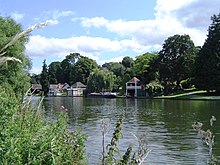Goring Lock
The weir runs back to an island under the bridge and then another weir goes from there to the Streatley bank.
History
There was originally a weir and ferry here belonging to Goring Priory, which became the property of millers who kept a flash lock. A report in a newspaper of 1674 tells how 60 people drowned in the lock when the ferryman rowed too close to it. The pound lock was built in August 1787 from oak. Over several decades operation of the lock appears to have been shared with that of Cleeve Lock until 1869. Following this there were plans to build a lock-house, but this was not started until 1879. The lock itself was replaced in 1886. In the last rebuild in 1921 the lock had intermediate gates installed, making two pounds, but these were removed in the refit in 2003.
Access to the lock
The lock is situated almost under the bridge and is easily accessible from both Goring and Streatley
Reach above the lock
The reach is only just over half a mile long. The Cleeve side of the river is occupied by large gardens stretching down the hillside with several boat-houses on the river. There are islands below Cleeve lock, with weirs between them, and these extend for some distance. On the Streatley side are meadows and woods.
The Thames Path, having crossed Goring Bridge to Streatley, continues through on the western bank to Cleeve Lock.
 |
Views of the lock and the weirs
 |
 |
See also
References
- ^ "Environment Agency Dimensions of locks on the River Thames". web page. Environmental Agency. 8 November 2012. Retrieved 17 November 2012. Dimensions given in metres
- ^ Fred. S. Thacker The Thames Highway: Volume II Locks and Weirs 1920 - republished 1968 David and Charles
- ^ "Environment Agency Distances between locks on the River Thames". web page. Environmental Agency. 19 November 2012. Retrieved 20 November 2012. Distances given in km
51°31′23″N 1°08′32″W / 51.52298°N 1.14235°W